There’s More to Magnesium Supplementation than Meets the Eye!
Jenny Paterson B.Sc
Why do so many riding horses show signs of magnesium deficiency especially in spring & autumn?
Signs include:
- Hypersensitivity
- Spooking
- Inability to release muscles and relax
- Inability to cope with stress
- Phonophobia (sensitivity to noise)
- Various degrees of unco-ordination
Dolomite?
Long term lack of magnesium becomes chronic and causes major problems later in life such as weak bones and arthritis.
This is because one of magnesium’s most important roles is to stimulate the production of calcitonin, the hormone which ensures that calcium is deposited in the bones rather than in soft tissues such as various organs (kidney stones) or arteries (arterial plaque is calcium not salt).
The catch is that you don’t see this happening from the outside until it is too late.
This is also why dolomite is a poor choice as a source of magnesium - as it is predominantly calcium with very little magnesium.
Potassium?
The fascinating thing is that the central molecule of chlorophyll, which gives grass its green colour is magnesium, so you would think that this would be the last thing our pasture fed horses would be short on.
It is the high potassium content of all grasses and legumes that indirectly cause the problems with magnesium absorption in horses.
Our own riding horses live on a “Dry Lot” on ad lib hay and they show no signs of magnesium deficiency (or any other deficiencies).

We don’t need to supplement any extra magnesium or salt because they are not eating anything that causes the imbalance:
'The best way to balance your horse’s diet is to remove the things that unbalance it!'
It is important to understand that horses get plenty of potassium from hay that has been grown on unfertilised country.
Then there is no need to supplement extra magnesium or salt – they stay calm and healthy on the Premium NZ Horse Minerals.
However many horses do fine on a diet of horse-friendly grass with the help of adding xtra salt and magnesium as in Alleviate, Alleviate C and GrazeEzy
The primary culprit is vegetative grass followed closely by lucerne, molassed items, protein meals and kelp.
Growing green grass, is very high in potassium, nitrogen and water and is comparatively low in magnesium.
As the grass matures the former items drop whilst magnesium content rises.
This is why late summer grass rarely causes problems. It has done its growing and is no longer in need of so much potassium and nitrogen and contains more magnesium.
In the body’s efforts to get rid of excess potassium via the kidneys, magnesium is also lost.Most
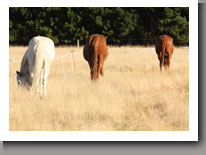 horses do very well after the grass has dried off but sooner or later the autumn rains arrive along with cooler night-time temperatures and all the problems associated with mineral imbalances (including staggers, laminitis, behaviour problems and head-flicking) appear again.
horses do very well after the grass has dried off but sooner or later the autumn rains arrive along with cooler night-time temperatures and all the problems associated with mineral imbalances (including staggers, laminitis, behaviour problems and head-flicking) appear again.Magnesium is crucial to about 350 different bodily functions. It is constantly being used up and needs to be replenished daily via the diet.
Did you know?...
The effect of inadequate magnesium intake is made worse by
- Low temperatures which increase magnesium requirements
- Adrenalin (anything that gets their ‘gander’ up)
- Lack of boron
Lack of magnesium is also linked with allergies as hypomagnesia leads to the release of histamines.
The take away message is that often it is not just about supplementing magnesium.
Obviously at certain times of the year it is wise to do so in conjunction with reducing or eliminating completely (depending on how ‘bad’ your horse is) green grass and lucerne from your horse’s diet.
A daily multi such as Premium that includes magnesium plus special products like Alleviate and GrazeEzy will help your horse cope during periods when grass causes problems.
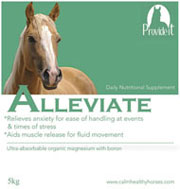 Alleviate, being the most absorbable magnesium available, actually reaches the brain and is excellent for helping them think straight under pressure. Great to start them on and keep on hand for stressful situations.
Alleviate, being the most absorbable magnesium available, actually reaches the brain and is excellent for helping them think straight under pressure. Great to start them on and keep on hand for stressful situations.
AlleviateC does the same as above but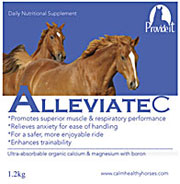 also contains organic calcium so is ideal for optimum nerve, muscle and respiratory function. Horses move better and are more trainable.
also contains organic calcium so is ideal for optimum nerve, muscle and respiratory function. Horses move better and are more trainable.
GrazeEzy is specifically to help neutralise 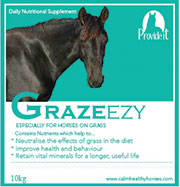 the effects of high potassium and nitrogen in the grass especially when they are showing signs of ‘increased excitability’, twitching when touched or brushed, agitation, or are ‘stiff’ or ‘tight behind’.
the effects of high potassium and nitrogen in the grass especially when they are showing signs of ‘increased excitability’, twitching when touched or brushed, agitation, or are ‘stiff’ or ‘tight behind’.
Premium NZ Horse Minerals, Alleviate & AlleviateC all contain boron which improves retention of calcium and magnesium in the body by anything up to 40%
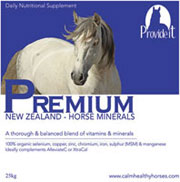
 Calm Healthy Horses
Calm Healthy Horses